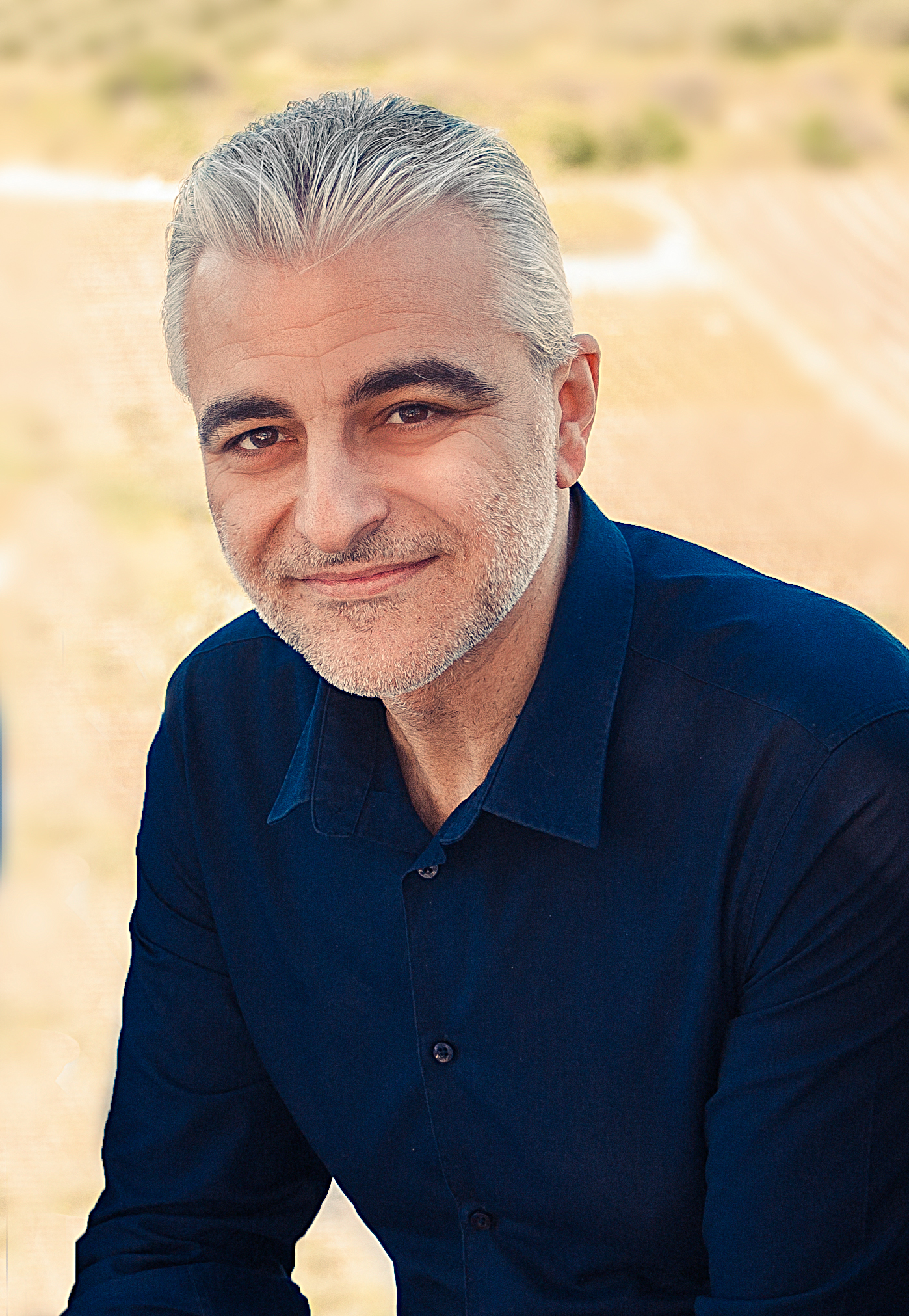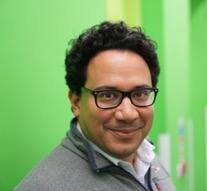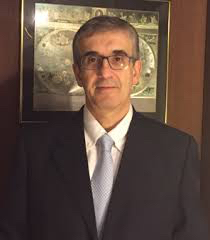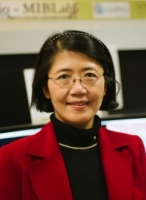Plenary Speakers
Research Director, Institute of Molecular Biology and Biotechnology (IMBB)
Professor of Molecular Systems Biology, Medical School of the University of Crete, in Heraklion, Greece

Dr. Nektarios Tavernarakis is the Chairman of the Board of Directors at the Foundation for Research and Technology-Hellas (FORTH), Research Director at the Institute of Molecular Biology and Biotechnology (IMBB), and Professor of Molecular Systems Biology at the Medical School of the University of Crete, in Heraklion, Greece. He is the Founder and first Director of the Graduate Program on BioInformatics at the Medical School of the University of Crete, and is also heading the Neurogenetics and Ageing laboratory of IMBB. He is an elected corresponding member of the Academy of Athens, an elected member and Vice President of the Scientific Council of the European Research Council (ERC), and an elected Chairman of the European Institute of Innovation and Technology (EIT) Governing Board and Executive Committee, the American Association for the Advancement of Science (AAAS), the European Molecular Biology Organization (EMBO), the German National Academy of Sciences (Leopoldina), the European Academy of Sciences and Arts, and Academia Europaea. He has also served as the Director of the Institute of Molecular Biology and Biotechnology.
Dr. Tavernarakis earned his Ph.D. degree at the University of Crete, and trained as a postdoctoral researcher at Rutgers University in New Jersey, USA. His work focuses on the molecular mechanisms of necrotic cell death and neurodegeneration, the interplay between cellular metabolism and ageing, the mechanisms of sensory transduction and integration by the nervous system, and the development of novel genetic tools for biomedical research. He has published numerous scientific papers in top-tier, cross-discipline, international scientific journals, in addition to invited book chapters, and other publications, including editorials, commentaries, and science-popularizing articles. His research has been commended internationally, and is supported by highly competitive funding from the European Union, international organizations and the Greek Government.
For Dr. Tavernarakis' scientific accomplishments, he has received several notable scientific prizes, including two ERC Advanced Investigator Grants, and an innovation-supporting ERC Proof of Concept Grant. He is one of the first in Europe, and the first in Greece, to have been awarded this highly competitive and prestigious grant twice. He is also the recipient of the EMBO Young Investigator award, the Alexander von Humboldt Foundation, Friedrich Wilhelm Bessel research award, the Bodossaki Foundation Scientific Prize for Medicine and Biology, the Empeirikeion Foundation Academic Excellence Prize, the BioMedical Research Award of the Academy of Athens, the Galien Scientific Research Award, and the Helmholtz International Fellow Award.
CEO, Kibur Medical Inc.

Dr. Colin Brenan is a serial life sciences entrepreneur who is presently the CEO of Kibur Medical Inc., an early-stage company commercializing a novel approach to precision cancer therapies and diagnostics from simultaneous and in situ molecular profiling of tumor response to up to 20 drugs or drug combinations with an implantable microdevice. Previously he was Founder/CEO and Director of the single cell instrumentation company 1CellBio Inc. (www.1cell-bio.com); formerly Founder/Chief Commercial Officer and Director of antibody drug developer HiFiBiO Ltd (www.hifibio.com); and, Managing Director of the Monsanto-Atlas Seed Fund Alliance at Atlas Venture (Cambridge, USA) where he identified and invested in seed and early-stage life science companies.
Prior to Atlas, Dr. Brenan was Director of Strategic Relationships for the Center for Integration of Medicine and Innovative Technology (CIMIT) – a Partners Healthcare innovation center (Boston, MA). Before joining CIMIT, Dr. Brenan was the Founder, Chief Technology Officer, SVP, Business Development and a Director of BioTrove Inc. (Woburn, USA), commercializing the OpenArrayTM, a nanofluidic PCR array, acquired by Life Technologies Inc. (LIFE:NASDAQ); and a Founder of the high throughput mass spectrometry company Biocius Inc., commercializing the RapidFireTM product spun-out from BioTrove and acquired by Agilent Inc. (A:NYSE).
Dr. Brenan is the inventor on 26 US patents, 27 non-US patents, +60 patent applications and published +50 peer-reviewed journal articles, book chapters and reports in the fields of bio-microsystems, confocal microscopy, spectroscopic imaging, drug discovery and microsurgical robotics. He has over a decade of experience in consulting for the US National Institutes of Health and is an active member of the IEEE EMBS. Dr. Brenan received his B.Sc. (Honours Physics), M. Eng. (Electrical), and Ph.D. (Biomedical Engineering) from McGill University (Montreal, Canada) and completed post-doctoral training at MIT (Cambridge, USA).
Genomic Expression Inc.

Dr. Tanya Kanigan is a scientist, inventor, and entrepreneur with 25 years of experience developing and commercializing tools for medical research. In her current position as Chief Analytics Officer at Genomic Expression Inc. (Beverly, MA) she develops bio- and clinical informatics pipelines for precision oncology. Formerly, as COO and Principal Scientist of Biocogniv Inc (Burlington, VT) she developed diagnostic tests for COVID-19 and pulmonary embolism based on machine learning analysis of routine lab results. Earlier in her career she co-founded an MIT spin-out called BioTrove that developed the OpenArrayTM nanofluidic array technology, now owned by Thermo Fisher Scientific and widely used in pharmacogenetics testing, miRNA analysis and infectious disease research. As an independent consultant, Dr. Kanigan also advises early-stage life science companies on technology commercialization strategy and serves as a reviewer for the NIH SBIR program.
Dr. Kanigan is an inventor on 18 issued US patents and several pending applications. She has published research in peer reviewed journals related to integrated optics spectroscopy, conducting polymer actuators, microfluidics for high throughput drug discovery and genomic analysis, and development of disease-predictive machine learning algorithms. Dr. Kanigan received her B.Sc. (Physics and Chemistry) from Carleton University (Ottawa, Canada) and Ph.D. (Chemistry) from McGill University (Montreal, Canada) and completed post-doctoral training in the Mechanical Engineering Department at MIT (Cambridge, MA, USA).
Professor, The University of Texas MD Anderson Cancer Center

Dr. Kristy K. Brock received her PhD in Nuclear Engineering and Radiological Sciences from the University of Michigan. After receiving her PhD, she joined the faculty at the University of Toronto (Radiation Medicine Program, Princess Margaret Hospital) and subsequently the faculty at the University of Michigan (Department of Radiation Oncology). She is currently a Professor with tenure in the Department of Imaging Physics at the University of Texas MD Anderson Cancer Center, where she is the Director for the Image-Guided Cancer Therapy Research Program. Her research has focused on image guided cancer therapy, where she has developed a biomechanical model-based deformable image registration algorithm to integrate imaging into treatment planning, delivery, and response assessment as well as to understand and validate imaging signals through correlative pathology. Her algorithm was licensed and incorporated into a commercial treatment planning system.
Dr. Brock is board certified by the American Board of Radiology in Therapeutic Medical Physics and holds a joint appointment with the Department of Radiation Physics at MD Anderson. Dr. Brock has published over 150 papers in peer-reviewed journals, is the Editor of the book 'Image Processing in Radiation Therapy' and has been the PI/co-PI on over 25 peer-reviewed, industry, and institutional grants. She currently serves as the Vice Chair of Science Council for the American Association of Physicists in Medicine as well as Vice Chair of the Big Data Subcommittee. In addition, she is the Practitioner Representative for the Administrative Committee of the IEEE Engineering in Medicine and Biology Society and the Physics Representative of the American Society for Radiation Oncology Nominating Committee.
Imperial College London

Dr. Aldo Faisal (@FaisalLab) is Professor of Artificial Intelligence & Neuroscience at the Dept. of Bioengineering and the Dept. of Computing at Imperial College London, where he leads the Brain & Behaviour Lab [www.faisallab.org] and is the holder of a UKRI Turing AI Fellowship. He is the Director of the £20Mio UKRI Centre for Doctoral Training in AI for Healthcare since 2019 and the Behaviour Analytics Lab at the Data Science Institute (London) since 2017. Aldo works at the interface of Machine Learning, Neuroscience and translational Biomedical engineering to help people in diseases and health. Core to his research discovery and technology innovation work is the idea that both artificial and human intelligence have common roots in the understanding, learning and generation of behaviour. He currently is one of the few engineers world-wide that lead their own clinical trials to validate their technology, His work received a number of prizes and awards, including the $50,000 Research Discovery Prize by the Toyota Foundation.
Department of Materials Science and Engineering
University of Ioannina

Prof. Dimitrios Fotiadis received the Diploma degree in chemical engineering from the National Technical University of Athens, Athens, Greece, in 1985, and the Ph.D. degree in chemical engineering and materials science from the University of Minnesota, Minneapolis, in 1990. He is currently a Professor of Biomedical Engineering in the Department of Materials Science and Engineering, University of Ioannina, Ioannina, Greece, where he is also the Director of the Unit of Medical Technology and Intelligent Information Systems, and is also an Affiliated Member of Foundation for Research and Technology Hellas, Institute of Molecular Biology and Biotechnology, Dept. of Biomedical Research. He was a Visiting Researcher at the RWTH, Aachen, Germany, and the Massachusetts Institute of Technology, Boston. He has coordinated and participated in more than 200 R&D funded projects. He is the author or coauthor of more than 220 papers in scientific journals, 400 papers in peer-reviewed conference proceedings, and more than 45 chapters in books. He is also the editor or coeditor of 25 books. His work has received more than 8500 citations (h-index = 46). He is a senior member of IEEE, member of IEEE Technical Committee of information Technology in Healthcare and the Editor in Chief of IEEE Journal of Biomedical and Health Informatics and Associate Editor for Computers in Biology and Medicine. His research interests include multiscale modeling of human tissues and organs, intelligent wearable/implantable devices for automated diagnosis, processing of big medical data, sensor informatics, image informatics, and bioinformatics.
Clinical Machine Learning, University of Oxford

Dr. David Clifton is Professor of Clinical Machine Learning in the Department of Engineering Science of the University of Oxford, and Official Fellow in AI & Machine Learning at Reuben College, Oxford. He is a Research Fellow of the Royal Academy of Engineering, and a Fellow of Fudan University, China.
Dr. Clifton studied Information Engineering at Oxford's Department of Engineering Science, supervised by Prof. Lionel Tarassenko CBE, Chair of Electrical Engineering, previous Head of the Department of Engineering Science. His research focuses on the development of machine learning for tracking the health of complex systems. His previous research resulted in patented systems for jet-engine health monitoring, used with the engines of the Airbus A380, the Boeing 787 "Dreamliner", and the Eurofighter Typhoon. Since 2008, he has focused mostly on the development of AI-based methods for healthcare. Patents arising from this collaborative research have been commercialized via university spin-out companies OBS Medical, Oxehealth, and Sensyne Health, in addition to collaboration with multinational industrial bodies.
Dr. Clifton holds a Grand Challenge award from the UK Engineering and Physical Sciences Research Council, which is an EPSRC Fellowship that provides long-term strategic support for "future leaders in healthcare". His research has been awarded over 30 academic prizes; in 2018, he was joint winner of the inaugural "Vice-Chancellor's Innovation Prize", which identifies the best interdisciplinary research across the entirety of the University of Oxford.
Georgia Institute of Technology and Emory University

Dr. May D. Wang is a full professor, GCC distinguished cancer scholar and Director of Biocomputing and Bioinformatics Core in Emory-Georgia Tech Cancer Nanotechnology Center at the Wallace H. Coulter Department of Biomedical Engineering at Georgia Tech and Emory University. Dr. Wang's primary research interest is biomedical and health informatics in systems medicine and healthcare, with the goal to speed up the discovery, development, and translation in modern biology, medicine, and health. She has played an active role in several working groups within National Cancer Institute (NCI/NIH) cancer Biomedical Informatics Grid (caBIG), and FDA-led Microarray Quality Control Consortium (MAQC) on biomarker and nanomedicine for personalized medicine. As the corresponding or co-corresponding author, Dr. Wang has published in journals such as Annals of Biomedical Eng, BMC Bioinformatics, Trends in Biotechnology, Nature Protocols, Proceedings of National Academy of Sciences, Annual Review of Medicine, and the Pharmacogenomics Journal.
Dr. Wang received Distinguished Cancer Scholar Award from Georgia Cancer Coalition in 2004, an Outstanding Undergraduate Research Faculty Mentor Award from Georgia Tech in 2005, and an Outstanding Service Award from IEEE BIBE in 2007. She is appointed as the Chair of Technical Committee on Information Technology for Health in IEEE Engineering in Medicine and Biology Society (EMBS) in 2011, and serves as associate editors for a couple of journals. Dr. Wang received Ph.D.EE, multidisciplinary MS degrees (EE, Applied Math, and CS) from Georgia Institute of Technology in USA, and BEng from Tsinghua University in China. In addition, Dr. Wang has several years of industrial R&D experience in the former AT&T Bell Labs, Intel Architecture Labs, Hughes Research Labs, Lucent Technologies Bell Labs, and Agere Systems. Dr. Wang was inducted to the College of Fellows of AIMBE.